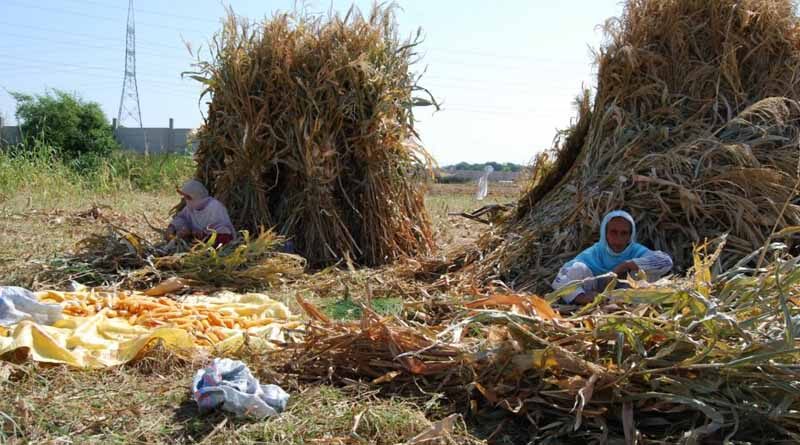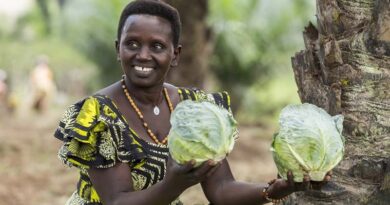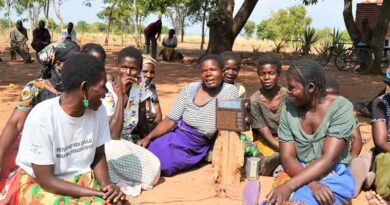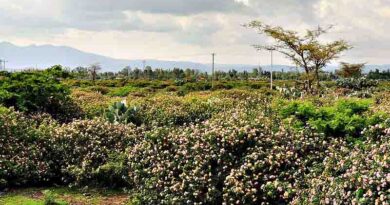Women farmers in Pakistan aren’t realising their potential – here’s why
17 January 2023, Pakistan: Women farmers in Pakistan are finding it difficult to access agricultural support. The needs of male farmers dominate most advisory services and socio-cultural set up due to restricted mobility of women farmers. This is a challenge in many low- and middle-income countries. And it contributes to a gender gap in agricultural productivity. Women-managed farms are up to 30% less productive than farms managed by men. However, closing the gap could boost agricultural production by up to 4%. And it could also improve food security and enhance the welfare of rural households.
Supporting women farmers in Pakistan through PlantwisePlus
CABI has launched the new PlantwisePlus programme in Pakistan. Here, gender gaps in farming are widespread. The programme is supporting women farmers with plant health knowledge. And it is also seeking to increase the uptake of climate-smart farming practices. It does this using digital advisory tools. Though a lot of rural areas women farmers donot have access to digital tools too, more advocacy with the government extension department to provide advisory services at the doorstep of the rural women farmers. Hire more women field assistances.
CABI recently produced a report on the gender gap in farming in Pakistan. It focused on gender-sensitive extension services in Pakistan. And it provided recommendations for making improvements. The assessment used the Gender and Rural Advisory Services Assessment Tool (GRAST). The FAO developed this tool for assessing gender sensitivity in rural advisory systems.
The report looks at three areas:
1. The national enabling environment, such as policies
2. Organization among extension service providers
3. The individual level, such as attitudes, perceptions and skills.
Gender norms prevent women from receiving support
There is one main barrier to women’s access to agriculture advisory services. Most people believe that women are farm helpers and not farmers in their own right. Most agricultural extension managers and field staff believe this. And this idea means that authorities do not design services to reach women farmers.
Gender-based social norms also influence the attitudes of extension staff. It is not customary, for example, for services to train women in agriculture. Socio-cultural norms restrict women’s mobility. Services often confine women’s training to closed spaces. And this stops them from participating in field demonstrations. Learning by doing is an essential element of training.
Unpaid care work also restricts women’s time to take part in agricultural training. And extension staff do not always organize training sessions at times suitable for women farmers. Furthermore, new technologies are replacing women’s labour. While services train men farm workers how to operate machinery, they do not train women. This gap will push women farmers out of the job market.
Moreover, advisory services widely use digital communication in Pakistan. For example, they use social media, mobile apps and voice and text messages. But most rural women farmers need help accessing this information. Socio-cultural restrictions mean they rarely own mobile phones.
Gender-sensitive policies are essential
One critical finding of the report is that Pakistan’s policy to support gender-sensitive extension is poor. No agricultural gender policy exists at the national or provincial levels. Authorities make statements about extending extension services to women farmers. But it is not clear how they are translating this into plans.
The last 15 years has seen a lot of change. Now women represent over 35% of the national and provincial assemblies. The Pakistani government is beginning to make changes. It is trying to improve the representation of women in public services, creating a quota system.
At least 15% of the staff should be women in extension department. And, on open merit the women can compete for any position they want. This is helping to turn the situation around. Punjab and Sindh provinces are recruiting more women agriculture officers and field assistants. In Punjab, 25% of officers are women. In Sindh, this figure is lower at 9% for agriculture officers and 5% for field assistants. Rawalpindi, which is semi-urban, has the highest representation of women agriculture officers at 60%.
Pakistan needs more women agricultural advisory officers
Barriers face women officers. They are unable to use motorcycles provided for transportation. Culturally, it is unacceptable for women to operate motorcycles. Women face security threats when travelling to the field. Culturally, women are not allowed to work in rural public areas, only within their boundaries.
In some rural communities, women agriculture officers face resistance from male farmers. Men do not want women to teach them. Women officers struggle to move for their work. Women are not expected to leave home and live alone. And the absence of public childcare facilities is a challenge for them.
Some agriculture extension offices have tried to address these challenges. In Punjab, extension departments have provided some women officers with vehicles. Supervisors reassign women officers to their home districts when possible. And women agriculture officers travel in pairs or with male field assistants. Supporting women in agriculture extension departments has a way to go, but change is coming.
The way forward for supporting women farmers in Pakistan
Policy-level change can really boost women’s farming skills. To this end, CABI made several recommendations to support women in Pakistan. At the service provider level, women’s equity is essential. Agricultural extension departments must set clear goals with concrete plans. Gender mainstreaming must be done within their projects and budgeting. Services must encourage women to take part in extension activities, alongside workable strategies designed to ensure more women participate. Training must focus on women’s specific needs. Officers must focus on shifting social norms. Focusing on the enabling environment is perhaps one of the biggest changes that can happen.
The shift will be challenging. But the gains will be worth the effort.
Also Read: Union Bank sanctions loans for 150 Garuda Kisan drones under Kisan Pushpak scheme
(For Latest Agriculture News & Updates, follow Krishak Jagat on Google News)















